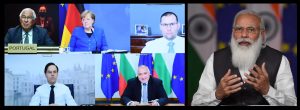It’s been a busy year for EU-India relations.
The previous EU-India Summit in July 2020 brought fresh momentum to ties and broadened the scope of cooperation to finally befit a “strategic” partnership.
Since then, Brussels and New Delhi have engaged in a host of discussions covering important aspects, including high level dialogues on trade, climate change, maritime security, human rights, as well as talks on 5G and AI, over a span of a few months.
On May 8, the two sides met in their first ever EU+27 Leaders Meeting format, where not just the European Commission and Council but also 27 European heads of state were present to meet with Indian Prime Minister Narendra Modi virtually. The extension of this rarely used format to India signals the importance Brussels now attaches to the EU-India partnership.
On the table were the following priority areas, as detailed in the joint statement released after the meeting.
Pandemic relief
The summit took place against the backdrop of India’s unprecedented surge in COVID-19 cases, for which the EU activated its Special Protection Mechanism to deliver valuable medical support to India. Unsurprisingly, cooperation on strengthening global health preparedness and supply chains was discussed. However, European leaders continue to remain skeptical on India’s requests to explore intellectual property waivers for vaccines, insisting on countries to open up exports of doses instead.
Trade and investment
Following on from the two High-Level Trade and Investment Dialogues held in February and April this year between India’s Commerce Minister Piyush Goyal and EU Trade Commissioner Valdis Dombrovskis, a resumption of talks on a free trade agreement (FTA), and negotiations on a separate investment protection agreement as well as an agreement on “geographical indicators,” were agreed upon. This is a step forward from the current deadlock of eight years after the negotiations were stalled in 2013 and is even more significant in the backdrop of the very recent suspension of the China-EU Comprehensive Agreement on Investment (CAI) from the European side, based on China’s retaliatory sanctions on European officials.
Connectivity agreement
The elephant in the room, most responsible for the recent coziness between Brussels and New Delhi, remained China. Tensions with China have prompted the two to view each other in a new light — as valuable partners in diversifying supply chains, reducing economic dependencies on China, and securing the Indo-Pacific.
Converging visions on connectivity coupled with apprehensions about China’s Belt and Road Initiative (BRI) in their extended neighborhoods led to the signing of an India-EU connectivity partnership, visualized as an alternative to the BRI that will focus on energy, transport and digital infrastructure, and collectively shape the norms around regional connectivity. Crucially, the private sector and private financing would play a key role in these projects, including in third countries and regions like Africa, Central Asia, and the Indo-Pacific, as highlighted. This follows the recent release of the European Council Conclusions on Cooperation in the Indo-Pacific, of which India is deemed an important pillar in ensuring the stability of a region through which a majority of world trade transits.
Other issues that featured prominently during the meeting included climate change, strengthening multilateralism including WTO reform, digital transformation and AI.
These converging Indian and European strategic impulses are underpinned by renewed political will on both sides, spurred by a more “geopolitical” Commission, as well as India’s belated realization of the benefits of working with the EU as a whole, in addition to individual member states.
The momentum between grand summits is being sustained by regular institutionalized dialogues that have cemented the partnership in recent times. The broadening of traditional hard conceptions of security to include climate, technology and health dimensions are ensuring the centrality of the other in their respective political consciousness.
However, the real test of the partnership lies within deliverables and implementation.
Obstacles to the infamous FTA are likely to continue on the sticking points of agriculture and automobiles, with a mismatch between the EU’s more ambitious goals of a comprehensive trade deal and India’s pursuit of a tailored limited one.
Amidst India’s sloganeering of “self-reliance” and opting out of the Regional Comprehensive Economic Partnership, whether resisting Chinese economic advances and consequences following Brexit will translate into potential concessions on trade on the part of India remain to be seen. Either way, the urgent need for post-pandemic recovery will ensure that the strategic element of the partnership does not overshadow its significant untapped economic potential, as estimated in this European Parliament study.
On China too, there may be disappointments, where India may be bargaining for more than what Europe can offer with its “pragmatic, flexible and multi-faceted approach” as stated by EU Ambassador to India Ugo Astuto, through which it justifies both cooperation and competition with China depending on the policy area.
Crucially, India’s deadly second COVID-19 wave has exposed the weaknesses and collapse of its healthcare system, potentially constraining its political choices and also impacting its credibility as a partner. How India manages this crisis going ahead will determine the trajectory of its relationship with Brussels and its overall foreign policy.
































